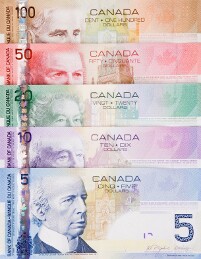
The Canadian dollar is trading sideways on Thursday as the currency attempts to find direction from a mixed bag of news. While positive economic data and higher oil prices, the US dollar strengthening and Washington nearing a trade deal with Mexico appear to have offset those gains.
According to Statistics Canada, the Canadian economy expanded 0.5% in May, the biggest increase in a year. The national economy benefited from recovering industries, many of which endured bad weather and maintenance shutdowns in the previous month.
The latest news could give the Bank of Canada (BOC) further ammunition to pull the trigger on another rate hike this year. The market is forecasting that the central bank will raise interest rates in September.
In other monetary policy news, the Bank of England (BOE) raised rates to 0.75%, the highest level since the height of the financial crisis in 2009. A September rate hike is also widely expected by the Federal Reserve.
It was reported on Wednesday that Washington has threatened to double tariffs to 25% on $200 billion worth of Chinese goods. However, investors were pleased to hear the news that the US is close to striking a trade deal with Mexico, suggesting that the administration is more focused on a bilateral agreement than a multilateral one.
Canada has been working hard behind the scenes to finish North American Free Trade Agreement (NAFTA) negotiations, but they have stalled in recent weeks as US-China trade tensions heighten. US officials say that trade talks with Ottawa have been âabsolutely amazing,â suggesting that a renewed NAFTA arrangement could come as late as October.
Stocks did not receive a boost from the progression in trade deliberations as they tumbled globally. The Dow Jones slipped nearly 100 points, the S&P 500 traded flat, and the NASDAQ jumped just 40 points.
Since Canada maintains a current account deficit, the economy could contract if the flow of capital or trade slows down. Moreover, the nation sends 75% of its exports to the US â June trade data is scheduled to be released on Friday
Oil prices, which have been lifting the loonie as of late, helped the Canadian dollar on Thursday. September West Texas Intermediate (WTI) crude futures advanced $1.23, or 1.83%, to $68.93 per barrel; and October Brent crude futures dipped $0.29, or 0.4%, to $72.61 a barrel.
The US Dollar Index surged 0.33% to 94.97, helping the greenback inch closer to a modest weekly gain. Year-to-date, the greenback has gained more than 3%, despite a slow start to 2018. The greenback also rose against a basket of currencies.
The USD/CAD currency pair rose 0.03% to 1.3007, from an opening of 1.3005, at 16:02 GMT on Thursday. The EUR/CAD currency pair plunged 0.35% to 1.5107, from an opening of 1.5161.
If you have any questions, comments or opinions regarding the Canadian Dollar,
feel free to post them using the commentary form below.